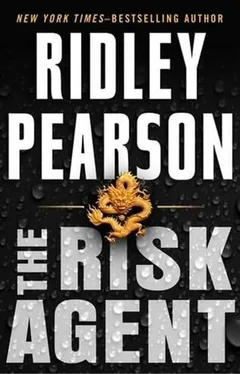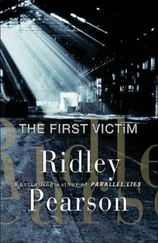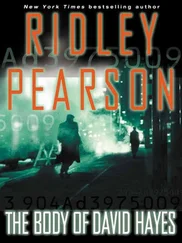“But you recall which farm roads,” she stated.
“Yes. Of course. I grew up here.”
“So did I,” she said. “So do not try to play with me.”
“Farm roads, cousin, I swear. Nothing more!”
“Show us,” Knox said.
Grace looked at Knox excitedly. “Farm roads. Land development.” He heard her pride, the sense of victory. Maybe the vodka.
Grace leaned her head back, sighed, and fell quickly to sleep, a smile faintly on her lips.
A few minutes out of town, they time-traveled back two or three hundred years. Half-acre rice farms, manicured to precise detail, formed an uninterrupted patchwork. Decaying dwellings lined the roads. Young children led beasts of burden by nose rings, or carried live chickens hanging by their feet.
“Where are we?” she asked the driver, opening her eyes.
“River road on way to Chong’an Cun,” the driver said.
“This is Chong’an Cun?”
“Precisely, cousin! You are indeed an islander!” He pulled the van to the side of the road. “This was our first stop.”
“How was it identified?” Knox asked. “How did they direct you here?”
“Village name,” the driver said.
“Only that?” Knox asked. “Nothing more specific?”
“Village was name enough,” the driver replied.
“Only this one village?” Grace inquired.
“No. Next we went to Wan Beicun.”
Knox took pictures with the iPhone. “Take us there, please,” Knox said.
The going was rough and slow on narrow mud roads meant for tuo la ji and water buffalo. They traveled through a half-dozen poor villages and arrived twenty minutes later at a crossroads. Again, the van stopped.
“This is it?” Grace asked.
“This was last stop before return to Chongming.”
“Your GPS,” Knox said. “Pass it to me, please.” Knox accepted it and wrote down the current lat/long location. He asked the driver to point out their position on a map he carried.
Knox spoke English to Grace, softly so the driver could not hear. “There was a second car service. They took a second car.”
Grace faintly nodded. “Damn,” she said. It was the first time he’d heard her swear.
“That way no one driver had the full picture of the land parcel,” he said.
She nodded. “Yes. But not a single parcel. Too big for that. It must be a project involving the expansion of several small towns. Something like that. We will never know. They have defeated us,” she said.
While she considered their failure, Knox was wondering how long it would take, once they left the car, for the driver to contact Preston Song and sell him the information that two people were trying to retrace his steps. How long after that for Song to notify the police?
“We need more than this,” she said.
“Marquardt and Song weren’t taking a Sunday drive. Your instincts were right.”
“We have nothing but a pair of small villages.”
The forty-minute drive back to Chongming was interminable, both of them exhausted. Knox fought to stay awake while she slept off the vodka.
They were dropped off and walked two blocks to the Toyota. Knox was switching out the plates as his phone rang.
She listened, spoke softly and hung up, cradling the phone to her chest.
“So?” Knox asked.
“Lu Jian has found nothing involving a land deal, big or small. Nothing beyond the seventh city projects already announced and underway. None involve Chong’an Cun or Wan Beicun.”
“That’s depressing.”
“But in the process of his asking around, he turned up a news story worthy of our interest.”
“Because?”
“A hit-and-run fatality, last month. A surveyor by the name of Yao Xuolong. A civil servant. This man was struck and killed along the roadside near Yuan Liu Qidui. The driver was never found.”
“And it means…?”
“Yuan Liu Qidui is a small village also surrounded by nothing but farms.” She snatched the map from Knox and took a moment to find it. “Here. You see?”
When combined with the two locations they had just visited, three quarters of a perfect rectangle were formed-that, or a right-angled triangle. It was impossible to miss the symmetry.
“It’s massive,” Knox said.
“He provided me the man’s family’s home.”
Knox said, “I’m game.”
“It may be nothing. A twenty-minute drive, a waste of time.”
“We need to get out of here,” Knox reminded. “I trust that driver about as far as I can throw him.”
“You switched the Toyota’s registration.”
“Yeah,” Knox said. “But believe me, they’re not that stupid.”
12:30 P.M.
HUAXIN ZHEN
In a small office cubicle, one of a hundred identical cubicles in a warehouse-like facility in a northwestern district of Shanghai, a woman was alerted to a priority status license plate match.
She called up the source video, recorded less than six hours earlier: the plate belonged to a stolen Toyota crossing over the bridge/tunnel to Chongming Island. In one video, the face of a waiguoren was spotted looking out a rear-seat side window. Her chest pounding, she called her manager, who assigned her additional eyes to help inspect plate capture video in an ever-widening grid.
Within twenty minutes, the information was texted to the phones of all law enforcement officers, including that of Inspector Shen, who had traveled to Chongming Island because of the Mongolian’s remark. With the text, Shen now had reason to visit the local precinct and solicit manpower and information.
If, during the arrest or incarceration or questioning of the waiguoren, the man was killed accidentally, it would be viewed as official business. Perhaps even attributed to the local police, instead of him.
12:35 P.M.
CHONGMING ISLAND
Off a narrow hard-packed dirt road, marked by a crumbling pair of stacked stone columns, a rutted lane led into a compound of five timber-built houses, the exteriors scabbing paint. Smoke rose from chimneys and hung in the air, tasting of cooking oil. Knox and Grace approached on foot.
A withered woman greeted them. She wore a loose-fitting white cloak under which could be seen the wide legs of simple three-quarter-length pants of coarse cloth and ancient black cloth shoes that might once have been embroidered with colorful birds and peonies.
“The grandmother,” Grace said. “She is getting her daughter. The white she wears is for mourning.”
A woman in her forties wore her grief as fatigue in what had once been spirited eyes. Knox and Grace were shown into a dim room and offered low stools around an open fire pit where a carbon-encrusted teapot boiled and steamed.
Knox kept up with introductions despite the woman’s difficult accent: the grandfather was a clay potter, this woman’s husband, his apprentice; the couple’s son, Yao Xuolong, had attended the local school and had gone on to be a surveyor.
Grace explained that she and her foreigner friend had heard that the son had been involved with a project of enormous significance bringing great honor to the family and that his importance in the project could not be easily measured. That they were interested in documenting the son’s achievements.
The mother showed them a photograph of her son and then proudly carried on for fifteen minutes while Knox and Grace sipped green tea. Grace did not interrupt, displaying an unusual patience, a quality Knox did not share with her.
“Now this charade,” the mother said angrily, her eyes brimming with tears.
“Please explain,” Grace said.
“They know nothing of my son! I explain to police many times, and yet they sweep me out the door like dust.”
“What do they not know of your son?”
Читать дальше












